Робочий зошит для практичних занять з навчальної дисципліни для здобувачів освіти І та ІІ курсів "Використання інфографіки при вивченні фразових дієслів"
Робочий зошит для практичних занять з навчальної дисципліни
для студентів І та ІІ курсів "Використання інфографіки при вивченні фразових дієслів"
МІНІСТЕРСТВО ОСВІТИ ТА НАУКИ УКРАЇНИ
Відокремлений підрозділ Національного університету біоресурсів та природокористування України «Боярський коледж екології та природних ресурсів»
ІНОЗЕМНА МОВА
Робочий зошит для практичних занять з навчальної дисципліни для студентів І та ІІ курсів
Використання інфографіки при вивченні фразових дієслів
КОНКУРС «Педагогічний ОСКАР - 2020»
НОМІНАЦІЯ «Сучасні засоби унаочнення»
СПЕЦІАЛЬНІСТЬ (201 «Агрономія», 205 «Лісове
господарство», 101 «Екологія», 193 «Геодезія та землеустрій», 206 «Садово-паркове господарство»,
122 «Комп’ютерні науки, 073 «Менеджмент», 072 «Фінанси, банківська справа та страхування», 075
«Маркетинг»)
Боярка – 2019
Укладач: Пашенцева Ілона Михайлівна, викладач англійської мови, спеціаліст другої категорії
Рецензент: Гапонюк Наталія Петрівна, спеціаліст вищої категорії, викладачметодист, завідуюча навчально-методичним відділом
Зошит містить практичні завдання з усіх тем навчальної дисципліни «Іноземна мова» згідно з навчальною програмою для студентів І та ІІ курсів спеціальностей: 201 «Агрономія», 205 «Лісове господарство», 101 «Екологія», 193 «Геодезія та землеустрій», 206 «Садово-паркове господарство», 122 «Комп’ютерні науки», 073 «Менеджмент», 072 «Фінанси, банківська справа та страхування», 075 «Маркетинг»).
Підібрані найпопулярніші фразові дієслова та дієслова, що використовуються у ЗНО. Можна використовувати їх під час опанування нового матеріалу, повторення, закріплення, підготовки до контрольної роботи та самостійної роботи студентів на заняттях.
Рекомендовано цикловою комісією гуманітарних і суспільних дисциплін.
Протокол №_______ від «___» ___________2019 р.
ПЛАН
1. ВСТУП
2. to add up………………………………………………………..…………….5
3. to blow up……………………………………………………………………6
4. to bring up ………………………………………………………………..….7
5. to call off …………………………………………………………….………8
6. to call on ………………………………………………………………….….9
7. to carry on ……………………………………………………………….…10
8. to cheer on …………………………………………………………...……..11
9. to cheer up ……………………………………………………………...…..12
10. to come across ……………………………………………………….……..13
11. to come up with …………………………………………………………….14
12. to do over ……………………………………………………..……………15
13. to fall apart ……………………………………………………..…………..16
14. to fill out ……………………………………………………………..……..17
15. to get along………………………………………………….………………18
16. to get away ……………………………………………………...………….19
17. to get over …………………………………………………………………..20
18. to give away ………………………………………………………………..21
19. to give back ………………………………………………………..……….22
20. to go on ………………………………………………………………….….23 21. to hand in ……………………………………………………………….….24
22. to hang up …………………………………………………………………..25
23. to hold on …………………………………………………………..………26
24. to hold up …………………………………………………………..………27
25. to leave out ………………………………………………………...……….28
26. to look after ………………………………………………...………………29
27. to look forward to …………………............................………….………….30
28. to look over ……………………………………………………………...…31
29. to look up ………………………………………………………………..….32
30. to pass out …………………………………………………………….…….33
31. to pull over…………………………………………………………...……..34
32. to put down …………………………………………………………..……..35
33. to put off ……………………………………………………………..……..36
34. to put up with……………………………………………………………….37
35. to throw away ………………………………………………………………38
36. to try on …………………………………………………………………….39
37. to turn down……………………………………………………………..….40 38. to turn off …………………………………………………………………..41
39. to turn up ………………………………………………………………..…42
40. to watch out………………………………………………………...……….43
41. Додатки……………………………….……………………………………57
42. ВИСНОВКИ…………………………………………………….……..…..61
43. ПЕРЕЛІК ВИКОРИСТАНИХ ДЖЕРЕЛ……………………………..…..62
ВСТУП
Освіта XXI століття - це освіта для людини. Завдання сучасної школи - це виховання компетентної особистості, яка володіє не тільки знаннями, професіоналізмом, високими моральними якостями, але й уміє діяти адекватно у відповідних ситуаціях спілкування, застосовуючи свої знання, досвід і беручи на себе відповідальність за дану діяльність.
Інфографіка або інформаційна графіка (англ. Information graphics, infographics) – це спосіб графічного відображення інформації, даних і знання, спрямований на швидке й чітке подання необхідної та складної інформації. Інфографіка «показує приховане, пояснює заплутане і адаптує незрозуміле». Дві треті інформації людина отримує через органи зору, водночас мислить і образами, що мають візуальну форму. Тому інформація, яка представлена візуально, сприймається швидше і викликає підвищену увагу, оскільки складає комплекс готових образів. При цьому текстовий контент завжди повинен знаходитись на першому місці.
Серед найвідоміших і фундаментальних праць з інфографіки варто назвати книги Ж. Бертена «Семіологія графіки», К. Уейр «Візуалізація інформації: сприйняття дизайну», Е. Тафті «Візуальне пояснення», Р. Крама «Крута інфографіка: ефективна комунікація з візуалізації даних та дизайну», в яких автори насамперед вказують на значення цього засобу візуалізації інформації в сучасному інформаційному просторі.
Перевага інформаційної графіки в тому, що вона дозволяє просто і наочно представити велику кількість даних або комплексну інформацію про предмети, включаючи складні взаємовідносини між ними. Її форми: карикатура, діаграма, ілюстрація, емблема, малюнок, стрічка часу із світлиною або посиланнями на певну інформацію, хмаринка тегів, мапи, плакати, схеми тощо. Будь-який образ підходить для створення інфографіки, якщо він добре сприймається, запам’ятовується, ефективно працює для передання даних. Основна мета інфографіки – інформування, при цьому її часто застосовують в якості доповнення до основного тексту. Стиль інфографіки залежить передусім від мети і адресата. Інфографіка базується на певних законах, тому далеко не кожне зображення з даними можна назвати інфографікою.
У даному посібнику метод інфонрафіки використаний для візуалізації найпопулярніших фразових дієслів в англійській мові.
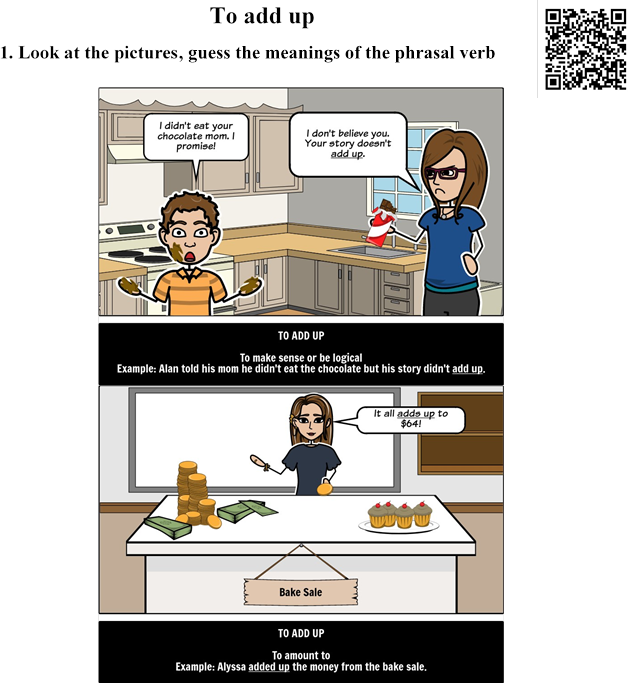 and describe them:
and describe them:
Translate into Ukrainian:
1. The changes in air quality are small, but after a while they do add up and affect people's health.
2. The fees were adding up.
3. You can add up to 5 videos to your listing.
4. If you add it all up what do you get?
5. I needed to use a calculator to add up the bill.
6. His story just doesn't add up.
7. Why would she disappear the day before her holiday? It just doesn't add up.
8. Their proposals do not add up to any real help for the poor.
To blow up
1. Look at the pictures, guess the meanings of the phrasal verb and describe them:
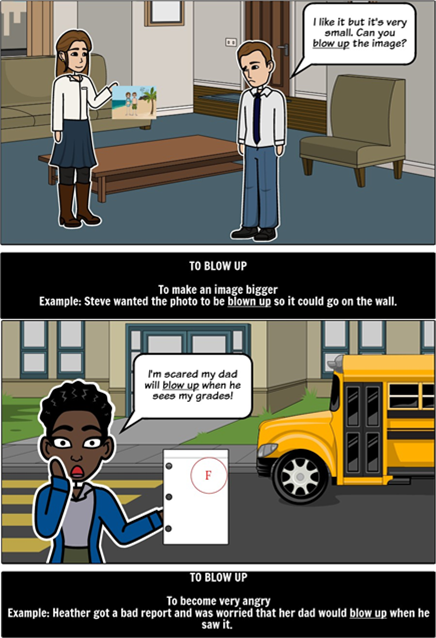
Translate into Ukrainian:
1. Tarentino worked in a video rental joint before he made Resevoir Dogs and blew up.
2. I was asleep for only two hours and my pager blew up!
3. Just watch, man - she's about to blow up after her next album drops.
4. You look as is you're feeling really good....are you blowing up?
5. If I don’t answer for my gf the first time shell blow up my phone.
6. Sally will blow up if you try to challenge what she is saying.
To bring up
1. Look at the pictures, guess the meanings of the phrasal verb and describe them:
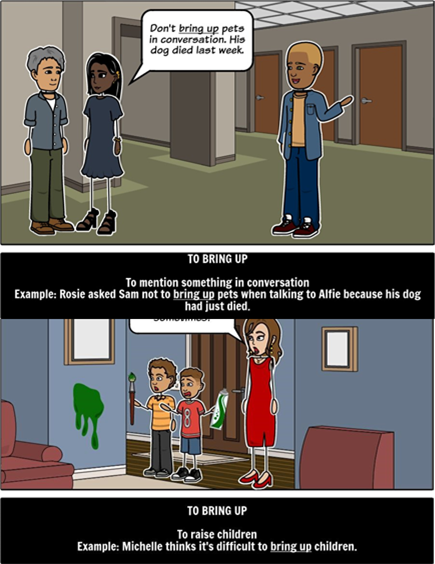
Translate into Ukrainian:
1. She brought up three sons on her own.
2. Our parents brought us up to believe in our own abilities.
3. These kids have been brought up on a diet of junk food and endless television.
4. Brown said the issue would be brought up again at the next climate convention.
5. I hate to bring this up but you still owe me £50.
6. Bring it up at the meeting.
7. Click with the right mouse button to bring up a new menu.
To call off 1. Look at the pictures, guess the meanings of the phrasal verb and describe them:
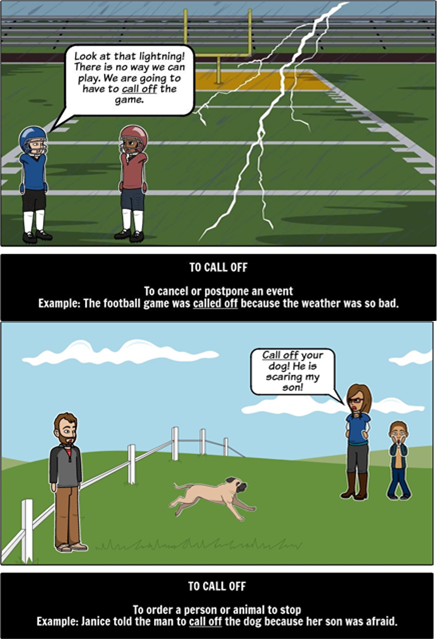
Translate into Ukrainian:
1. Call off your dog, he's biting my leg!
2. The game was called off.
3. They called off the party after half of those invited couldn't make it.
4. The teacher began to call off the names on his list.
5. Rescuers had to call off the search because of worsening weather conditions.
6. They refused to obey the court's order to call off the strike.
7. She’s called off the wedding.
8. If we have much more rain, the game might be called off.
To call on
1. Look at the pictures and describe them:
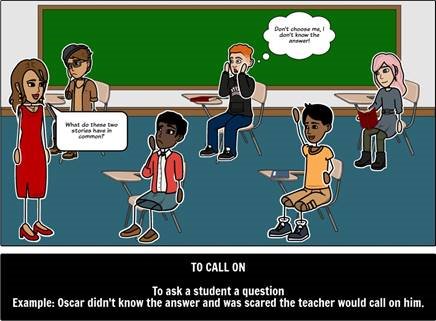
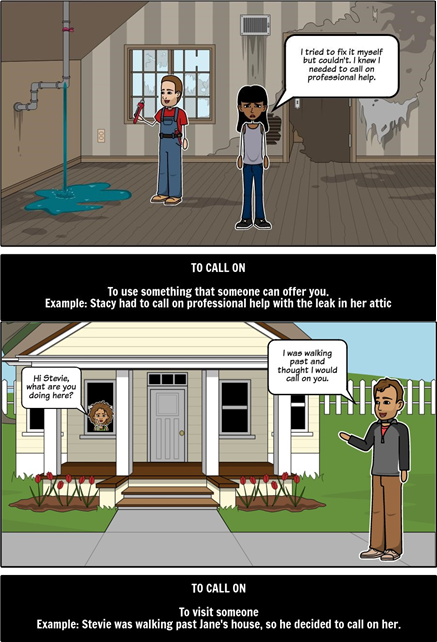
Translate into Ukrainian:
1. The human rights group has called on the US to end the death penalty.
2. We could call on my parents if we have time.
3. We may need to call on professional help.
4. She called on all her reserves of courage to face the ordeal ahead of her.
5. Union leaders called the strike off at the last minute.
6. She called on Americans to be more tolerant of each other.
7. The teacher called on me, and I didn’t know the answer.
8. She went to the hospital to call on a sick friend.
To carry on
1. Look at the pictures, guess the meanings of the phrasal verb and describe them:
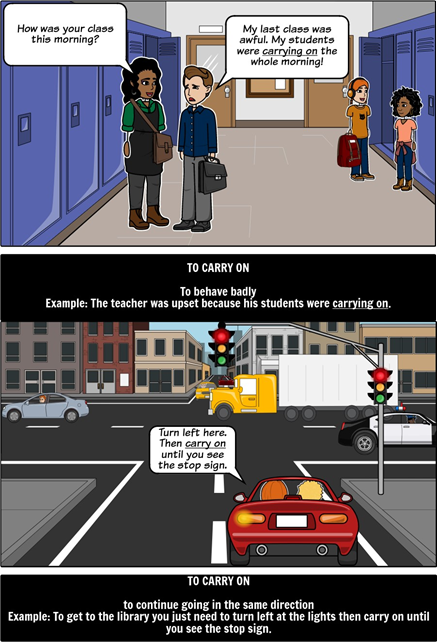
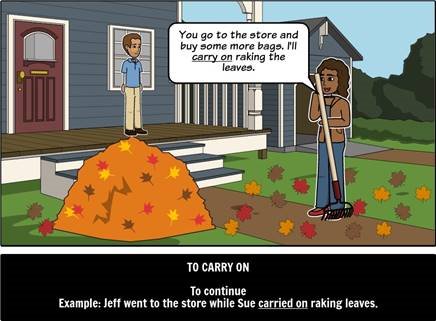
Translate into Ukrainian:
1. The children have been carrying on all day.
2. There was a real carry-on when Pat was found kissing Ashley.
3. Carry on. You’re doing fine.
4. For the moment we’ve been told to carry on as usual.
5. He moved to London to carry on his work.
6. Turn left at the traffic lights and carry on up the high street.
7. Her daughter intends to carry on her mother’s research.
8. ‘It’s no good you carrying on, Mother,’ said Sally. ‘I’m not going to marry him.’
To cheer on
1. Look at the pictures, guess the meanings of the phrasal verb and describe them:
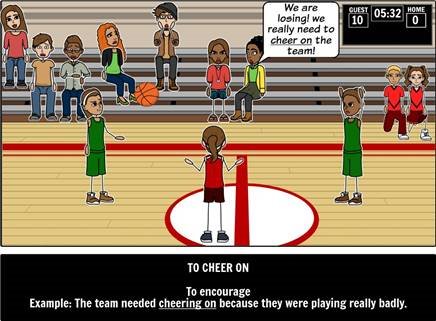
Translate into Ukrainian:
1. I’ll be there to cheer you on when the race starts.
2. I'm your mother—I'm going to cheer you on in anything you do!
3. The whole town came out to cheer on the high school football team in the championship game.
4. We cheered them on, and they won. We cheered on the team. Sam cheered Jane on.
5. The spectators cheered the runners on as they passed by. I always cheer on the team that is losing.
6. Fans filled every seat available to cheer on the team.
7. Fans filled every seat available to cheer on the team.
To cheer up
1. Look at the pictures, guess the meanings of the phrasal verb and describe them:
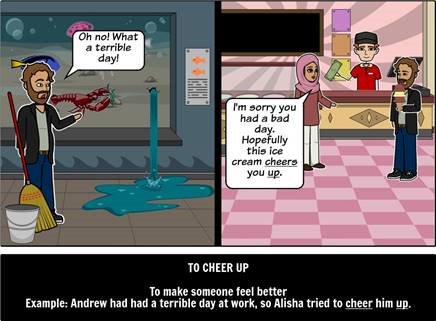
Translate into Ukrainian:
1. I tried to cheer him up, but he just kept staring out of the window.
2. ‘Cheer up,’ he said. ‘It can’t be that bad.’
3. Cheer up a dull room with fresh flowers.
4. Cheer up! The worst is over.
5. They cheered up when they saw us coming along.
6. Here’s a bit of news that will cheer you up.
7. You both need cheering up, I think.
8. I bought some posters to cheer the place up a bit.
9. I tried to cheer him up by telling a joke.
To come across
1. Look at the pictures, guess the meanings of the phrasal verb and describe them:
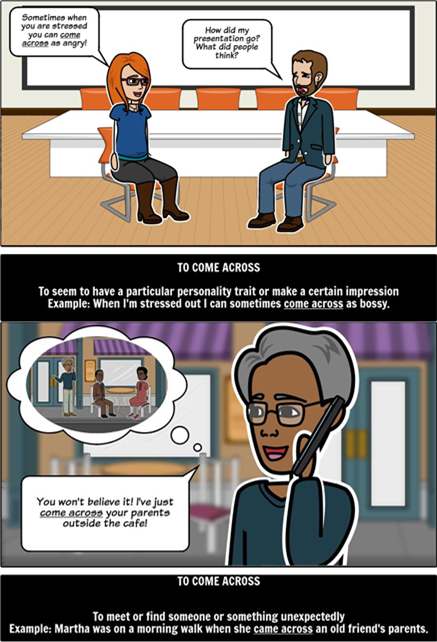
2. Translate into Ukrainian:
1. I came across an old diary in her desk.
2. I’ve never come across anyone quite like her before.
3. We’ve come across a few problems that need resolving.
4. Your point really came across at the meeting.
5. He comes across as a very intelligent sensitive man.
6. She sometimes comes across as being rather arrogant.
7. I don’t think I came across very well (=seemed to have good qualities) in the interview.
8. Digging in the garden, she came across some pieces of bone.
To come up with
1. Look at the pictures, guess the meanings of the phrasal verb and describe them:
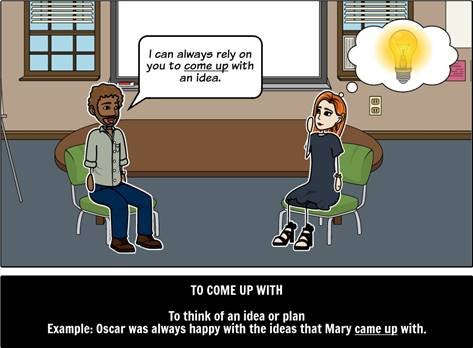
Translate into Ukrainian:
1. Is that the best excuse you can come up with?
2. We’ve been asked to come up with some new ideas.
3. We wanted to buy the house but we couldn’t come up with the cash.
4. How am I supposed to come up with $10,000?
5. We’re in big trouble if we don’t come up with the money by 6 o’clock.
6. Is that the best you can come up with?
3. Match the pictures with the correct phrasal verbs:
to add up, to blow up, to bring up, to call off, to call on, to carry on, to cheer on, to cheer up, to come across, to come up with
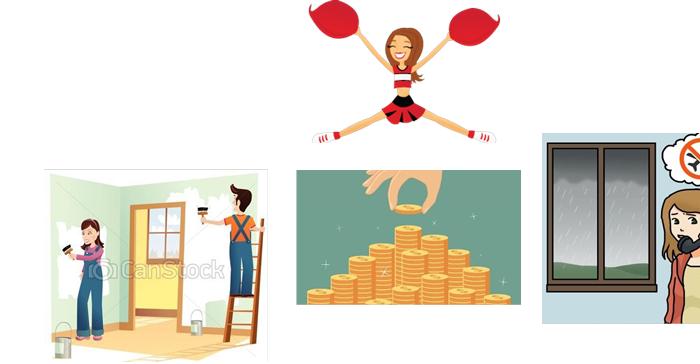
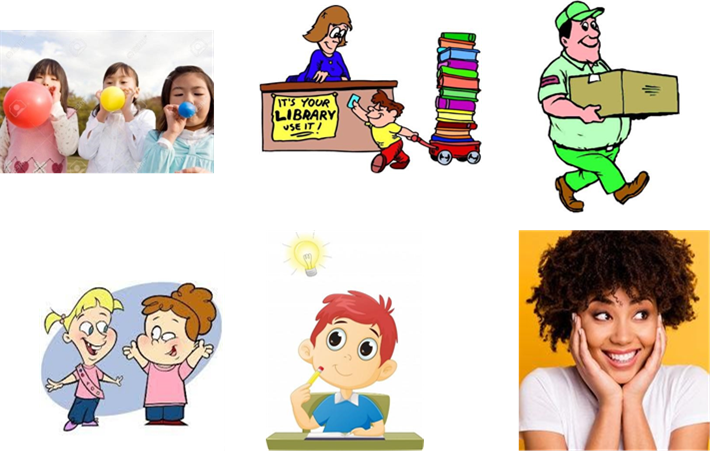
 To do over
To do over
1. Look at the pictures, guess the meanings of the phrasal verb and describe them:
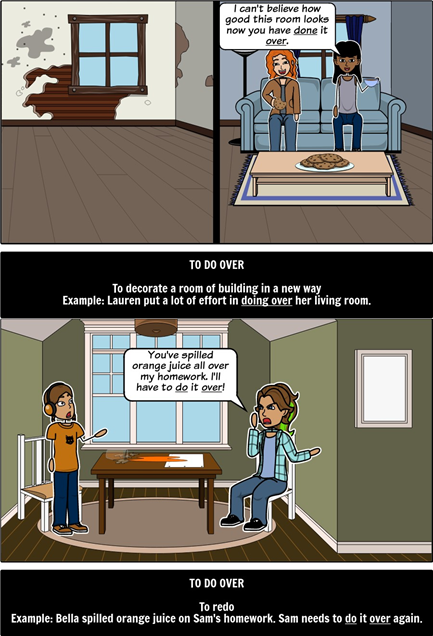
Translate into Ukrainian:
1. As soon as I opened the door, I could see the place had been done over.
2. He was done over by a gang of kids.
3. Can we afford to have the house done over?
4. OK, we’ll do it over, but try to sing the right words this time.
5. The whole apartment had been done over in an Art Deco style.
6. If you make too many mistakes, you’ll have to do it over.
7. Of course, the rules of games do change over time.
8. There was nothing to do but start over: I went into the hospital with two infections, pneumocystis and chicken pox.
To fall apart 1. Look at the pictures, guess the meanings of the phrasal verb and describe them:
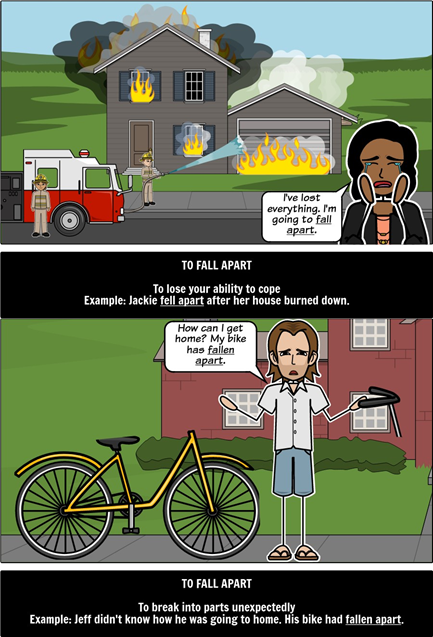
Translate into Ukrainian:
1. Don’t be reckless or your plans may fall apart.
2. The health service is falling apart at the seams.
3. Tommy’s old bicycle was rusty and falling apart.
4. The book fell apart in my hands.
5. She had to get some rest or she was going to fall apart.
6. When his wife left him, his world fell apart.
7. I need some new shoes. These are falling apart.
8. It just fell apart in my hands!
To fill out 1. Look at the pictures, guess the meanings of the phrasal verb and describe them:
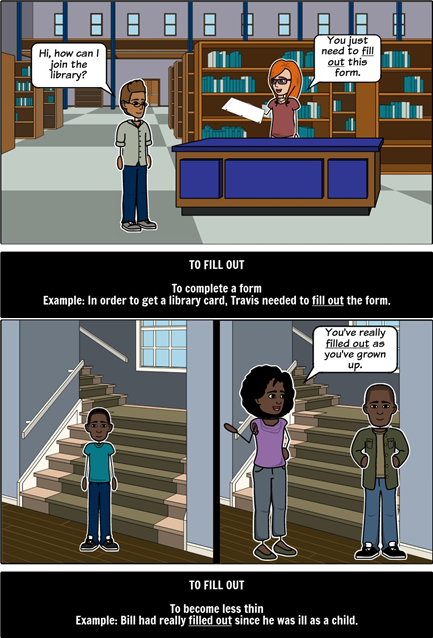
Translate into Ukrainian:
1. If you fill out, or your body fills out, you become slightly fatter.
2. At puberty, a girl’s body begins to fill out.
3. It took me several hours to fill out the application form.
4. Sam’s really filled out, hasn’t he?
5. When John is older and fills out some, he’ll be an outstanding athlete.
6. The 9m taxpayers obliged to fill out self-assessment forms must file their returns by September 30.
7. Please fill out the form in pen.
8. Claimants will need to fill out the appropriate paperwork.
To get along
1. Look at the pictures, guess the meanings of the phrasal verb and describe them:
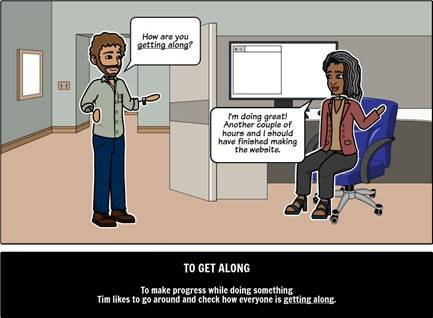
Translate into Ukrainian:
1. I get along well with most of my colleagues.
2. I got along much better in my new job.
3. How are you getting along with your schoolwork?
4. You’d better be getting along now.
5. We’ve always got along quite well.
6. They seem to get along with each other.
7. How’s Sam getting along at university?
8. Julie's nice, but I don't really get on with her brother.
To get away
1. Look at the pictures, guess the meanings of the phrasal verb and describe them:
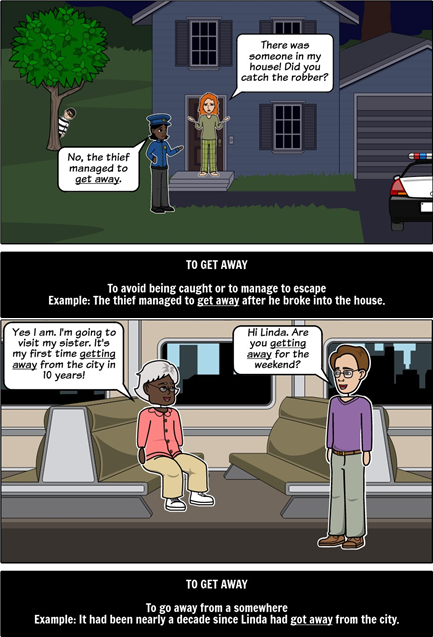
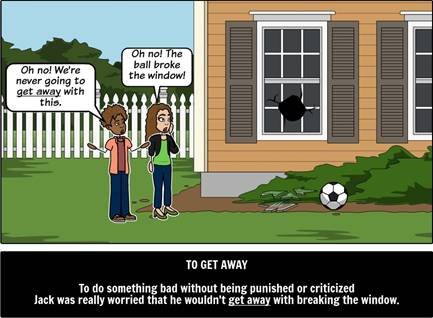
Translate into Ukrainian:
1. The meeting dragged on, and I didn’t get away until seven.
2. I like to get away from London at the weekend.
3. Will you manage to get away this summer?
4. We’re hoping to get away to Scotland for a few days.
5. The three men got away in a stolen car.
6. Detectives followed the man as far as the harbour, but then he jumped into a speedboat and got clean away.
7. Thieves got away with silver and several valuable paintings, including one by Picasso.
To get over
1. Look at the pictures, guess the meanings of the phrasal verb and describe them:
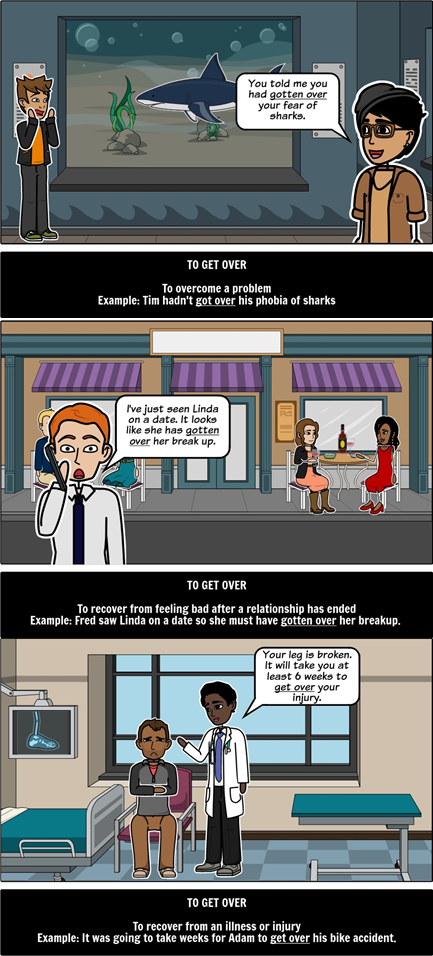
Translate into Ukrainian:
1. It’s taken me ages to get over the flu.
2. She never got over the death of her son.
3. It’s important that we get this message over to young people.
4. I’ll be in touch once I’ve got my exams over.
5. I can’t wait to get the interview over with.
6. Once we’ve got over the first few months, we should be making a reasonable profit.
7. I can’t get over how well you look.
8. Get over yourself! Nobody cares if you’ve made a mistake.
To give away
1. Look at the pictures, guess the meanings of the phrasal verb and describe them:
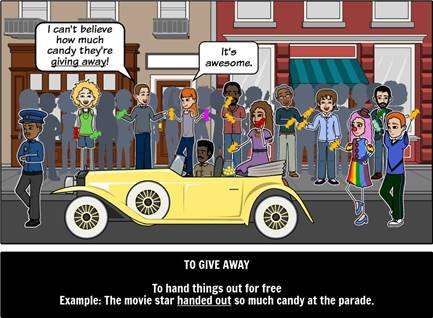
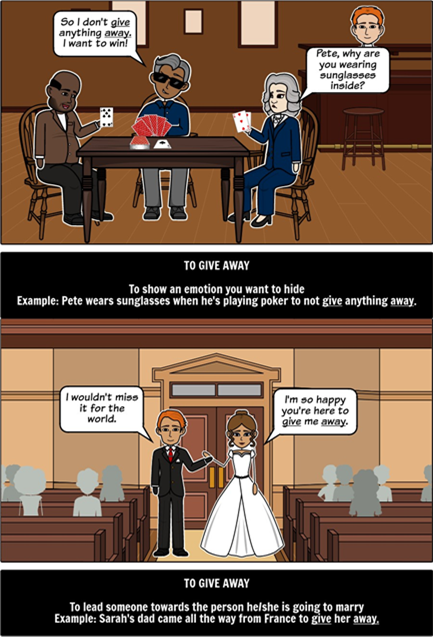
Translate into Ukrainian:
1. I gave most of my books away when I left college.
2. Give your old clothes away to a thrift shop.
3. We’re giving away a free diary with tomorrow’s newspaper.
4. We have 1,000 CDs to give away to our readers.
5. Don’t worry, I won’t give you away.
6. Sue tried to smile, but her voice gave her away.
7. I don’t want to give the game away (=give information that should be secret) by saying too much.
8. The Democrats are now in danger of giving the whole election away.
To give back
1. Look at the pictures, guess the meanings of the phrasal verb and describe them:
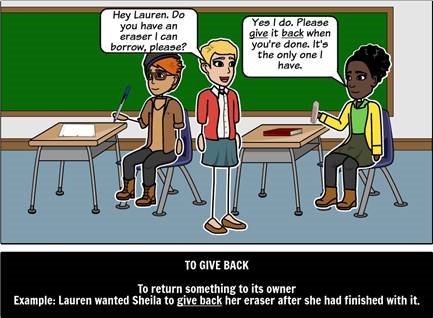
Translate into Ukrainian:
1. This isn’t your money and you must give it back.
2. Of course you can have a look at it, as long as you give it back.
3. I’ll give the keys back to you tomorrow morning.
4. Her ex-husband refused to give her back any of her old photos and letters.
5. He underwent an expensive operation to give him back his sight.
6. The company finally agreed to give the women their old jobs back.
7. This legislation will give more power back to local authorities.
8. He simply could not remember in the end whether Miss Harker had given it back or not.
To go on
1. Look at the pictures, guess the meanings of the phrasal verb and describe them:
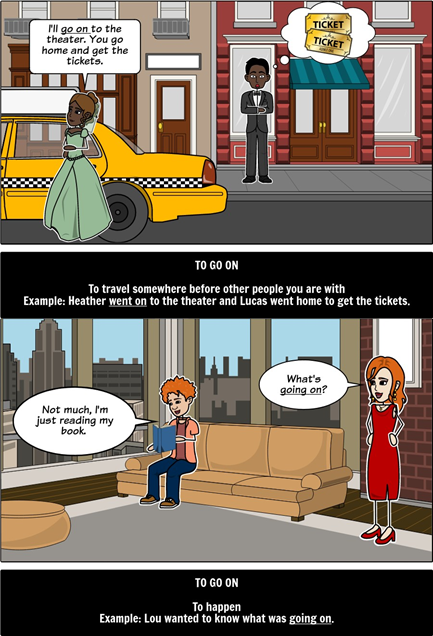
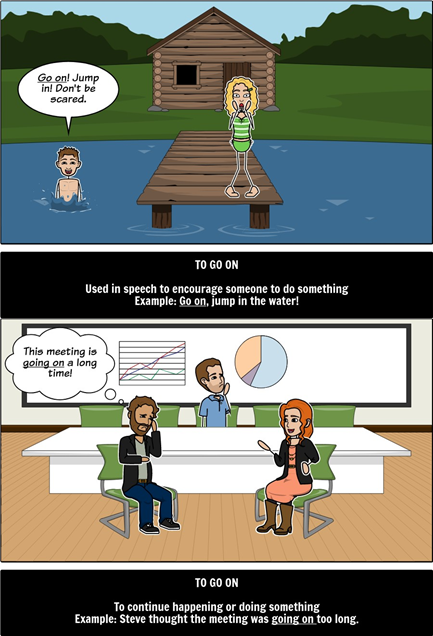
Translate into Ukrainian:
1. He went on working until he was 91.
2. One of the actors was unwell and couldn’t go on with the performance.
3. I can’t go on like this for much longer.
4. The screaming went on and on (=continued for a long time).
5. What were the children doing while all this was going on?
6. She went on to become a successful surgeon.
7. ‘But, ’ he went on, ‘we have to deal with the problems we’re facing.’ 8. The way she went on, you would have thought it was all my fault.
3. Match the pictures with the correct phrasal verbs:
to do over, to fall apart, to fill out, to get along, to get away, to get over, to give away, to give back, to go on, to hand in
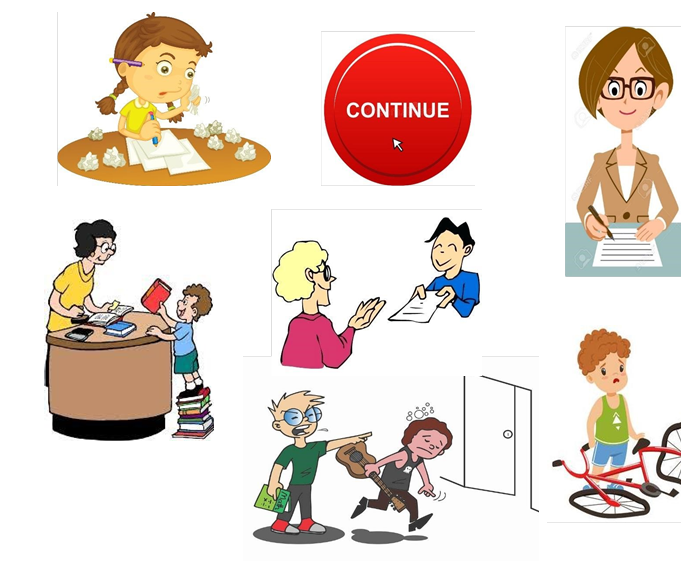


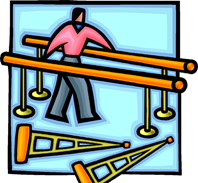
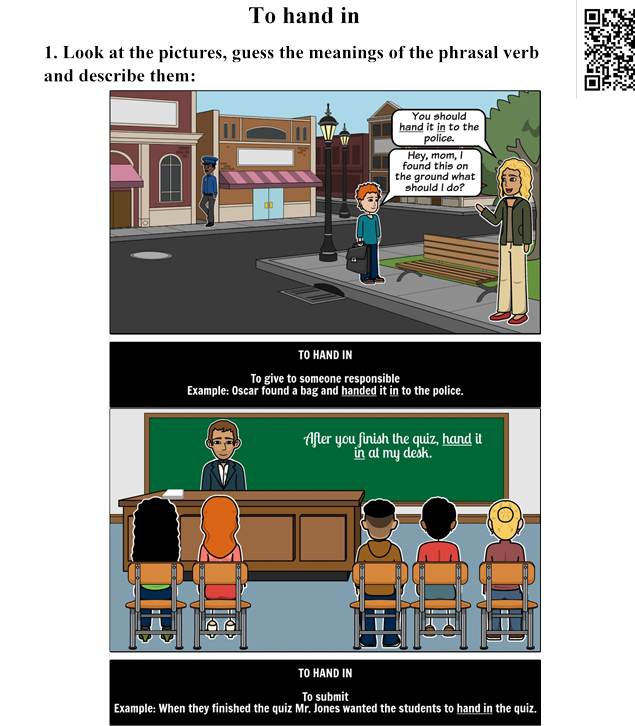
Translate into Ukrainian:
1. Please hand in your keys when you leave the hotel.
2. All essays must be handed in by Tuesday.
3. He’s going on Friday. He’s already handed in his notice.
4. All application forms must be handed in before the end of the month.
5. I'm supposed to have handed in a first draft of my dissertation.
6. My advice to anyone who finds anything on a bus is to hand it in to the police.
7. If you hand in your notice or resignation, you tell your employer, in speech or in writing, that you no longer wish to work for them.
To hang up
1. Look at the pictures, guess the meanings of the phrasal verb and describe them:
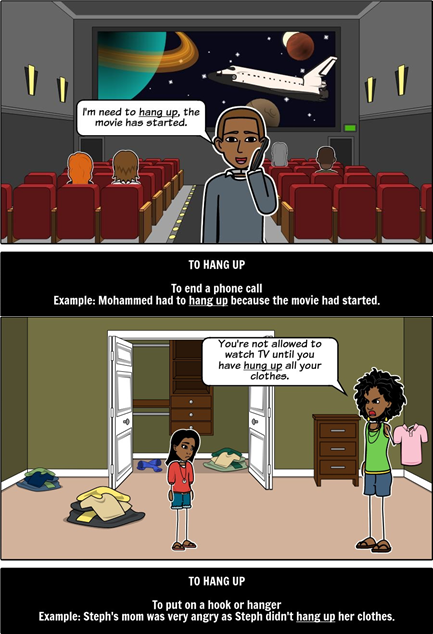
Translate into Ukrainian:
1. ‘Get lost!’ she shouted, and hung up on me.
2. The women hung up their coats and sat down.
3. Nicola has decided it’s time to hang up her dancing shoes.
4. I said goodbye and hung up.
5. She took her coat off and hung it up.
6. But don't hang up on the shares because I reckon they could hit Pounds 4 by Christmas.
7. Anne saw her own coat hanging up on the rack with the others.
8. When we talk on the phone, she may hang up on me.
To hold on
1. Look at the pictures, guess the meanings of the phrasal verb and describe them:
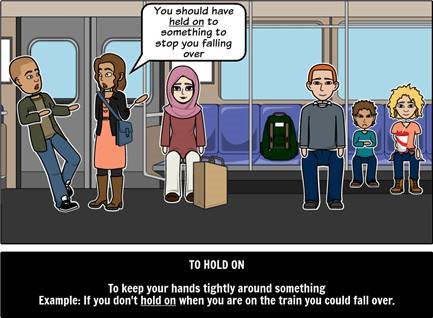
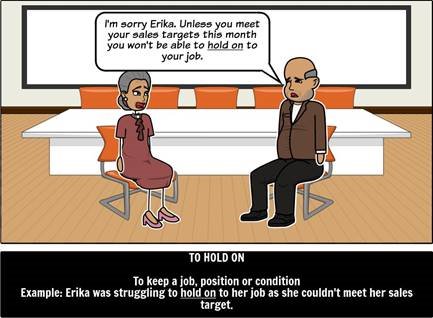
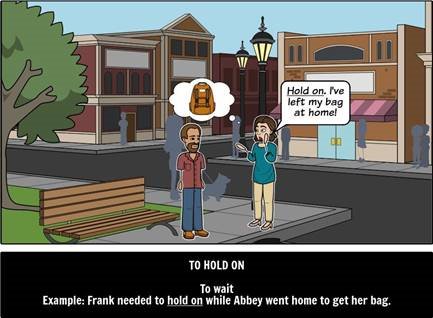
Translate into Ukrainian:
1. Hold on, I’ll just get my coat.
2. Hold on a minute! Isn’t that your brother’s car over there?
3. Can you hold on? I’ll try to find her.
4. She can walk now without holding on to anything.
5. These beautiful new books, filled with morals and happy endings, help us hold on to our storytelling heritage.
6. He could hold on to office even though so severely disabled as to be unable to lead.
7. He wasn't sure that he would be given a chance to hold on to his wife.
To hold up
1. Look at the pictures, guess the meanings of the phrasal verb and describe them:
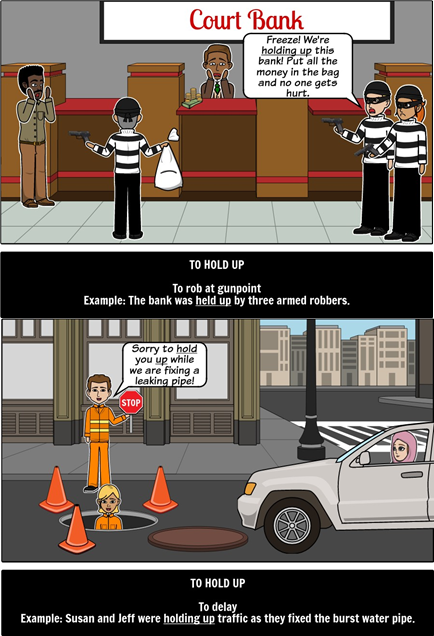
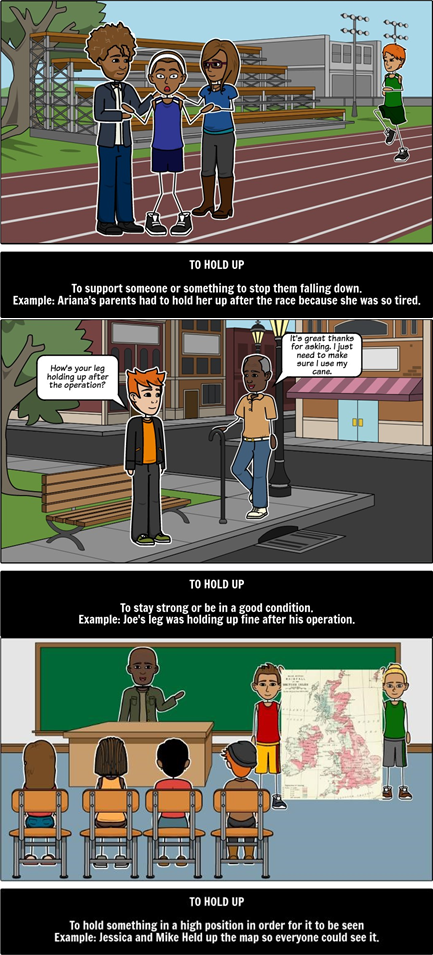
Translate into Ukrainian:
1. The roof is held up by massive stone pillars.
2. Two armed men held up a downtown liquor store last night. 3. Sorry I’m late – I was held up at work.
4. Two armed men held up a downtown liquor store last night.
5. His physical condition has held up well.
6. Her stubbornness on this one issue is holding the whole deal up.
7. Protesters held up work on the new road.
To leave out
1. Look at the pictures, guess the meanings of the phrasal verb and describe them:
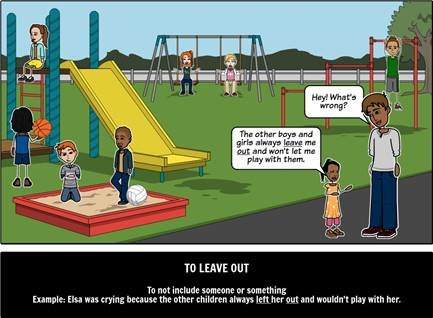
Translate into Ukrainian:
1. She outlined the case to him, being careful not to leave anything out.
2. Kidd has been left out of the team.
3. New fathers often feel left out when baby arrives.
4. But hang on a minute ... Do you think I might have left anything out?
5. Don't be afraid to leave things out!
6. Since they knew there were no diamonds in these harder rocks, they just left them out in the fields.
7. If this would otherwise be done leaving food out or in the refrigerator, then the microwave actually adds to energy use.
8. Clint woke up when she left and looked out the window.
To look after 1. Look at the pictures, guess the meanings of the phrasal verb and describe them:
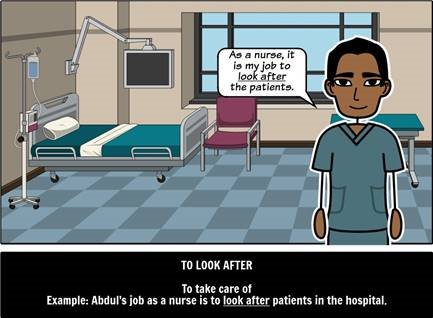
Translate into Ukrainian:
1. Don’t worry, I’ll look after the kids tomorrow.
2. Susan looked after us very well. She’s an excellent cook.
3. You could tell that the horse had been well looked after.
4. I’m leaving you here to look after the business until I get back.
5. Don’t worry about Maisie – she can look after herself.
6. How can I find children who need looking after?
7. I have about 3 times as much glass to look after.
8. I searched for her last night so that she could look after you.
9. They were well looked after and were given plenty of beer, cigarettes and extras at Christmas time.
To look forward to
1. Look at the pictures, guess the meanings of the phrasal verb and describe them:
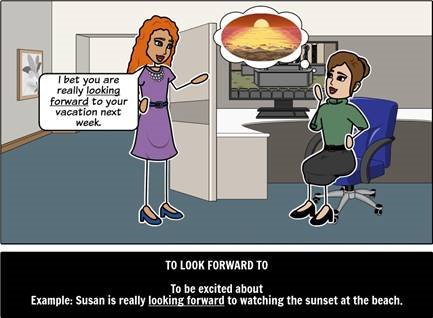
Translate into Ukrainian:
1. I’m really looking forward to our vacation.
2. My mother says she’s looking forward to meeting you.
3. I have a new set of friends and something to look forward to everyday.
4. My coming summer holiday started on the same day as my cousin's, and I was much looking forward to it.
5. He said he would miss having company day and night but was looking forward to returning home.
6. He looked forward to the end of his shift.
7. She would find herself looking forward to their meetings and to their conversations even if they were slightly strange sometimes.
8. She would find herself looking forward to their meetings and to their conversations even if they were slightly strange sometimes.
To look over
1. Look at the pictures, guess the meanings of the phrasal verb and describe them:
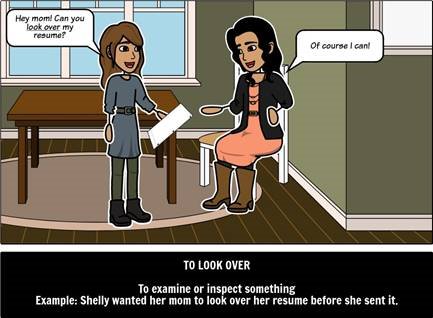
Translate into Ukrainian:
1. Do you have a few minutes to look these samples over?
2. He’d been looking over the leaflets he’d picked up earlier.
3. An American inspection team had looked over sites in January.
4. Marge opened up while the fellas looked the street over.
5. Then he slowly looks me over before turning his appraising glance to the cabin, which he begins to circle.
6. He smiled widely and held out a hand, but the way he looked Maxim over gave him a little pang of disquiet. 7. A serious look came over his face.
8. He saw Lily's head turned determinedly away from Stephen, looking out over the fields.
To look up
1. Look at the pictures, guess the meanings of the phrasal verb and describe them:
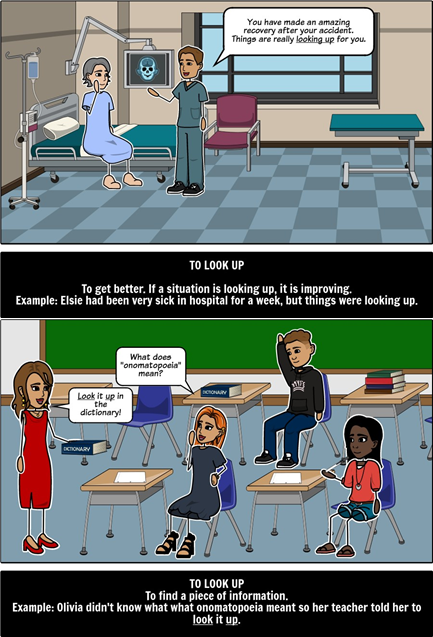
2. Translate into Ukrainian:
1. Now the summer’s here things are looking up!
2. Look the word up in your dictionary.
3. I’ll just look up the train times.
4. Don’t forget to look me up when you come to Atlanta.
5. There was a loud bang outside the classroom, and we all looked up.
6. "Goodbye, then, " she said, without even looking up from her book.
7. I'll give you my address so you can look me up whenever you're in London.
8. However, following the campaign of certain organisations and individuals like Jaqueline Drake, things are looking up.
3. Match the pictures with the correct phrasal verbs:
to hang up, to hold on, to hold up, to leave out, to look after, to look forward to, to look over, to look up
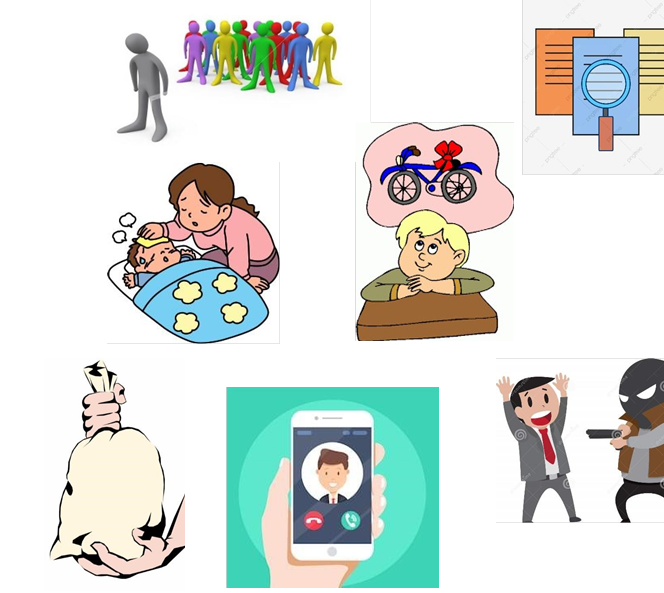

To pass out
1. Look at the pictures, guess the meanings of the phrasal verb and describe them:
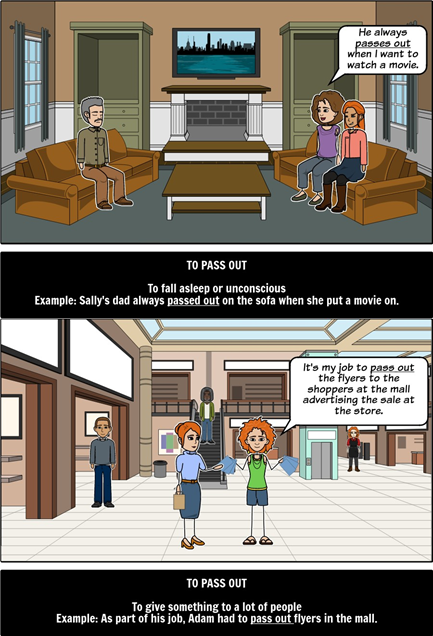
2. Translate into Ukrainian:
1. I nearly passed out when I saw all the blood.
2. When I first smoked a cigarette, I almost passed out.
3. I think the poor guy passed out. It looks like he's had a lot to drink.
4. People everywhere were passing out from the heat.
5. The hall was silent as the examination papers were passed out.
6. I passed out from AIIMS, New Delhi in 2008.
7. The new officers passed out from Britannia Royal Naval College on Thursday 1 August .
8. He passed out from the heat.
To pull over
1. Look at the pictures, guess the meanings of the phrasal verb and describe them:
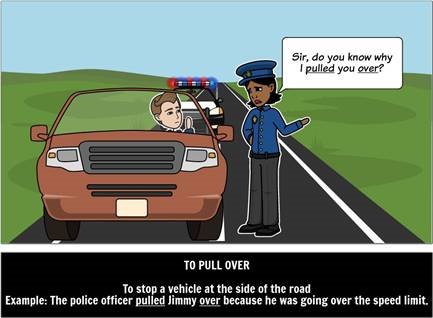
2. Translate into Ukrainian:
1. Let’s pull over and have a look at the map.
2. The cops pulled me over because one of my brake lights wasn’t working.
3. The policeman signalled to him to pull over.
4. He pulled the car over.
5. A cop pulled him over and gave him a speeding ticket.
6. A policeman was standing by the side of the road, signalling to me to pull over.
7. The truck pulled over and a man got out.
8. He got pulled over on the way home and had to take a breath test.
To put down
1. Look at the pictures, guess the meanings of the phrasal verb and describe them:
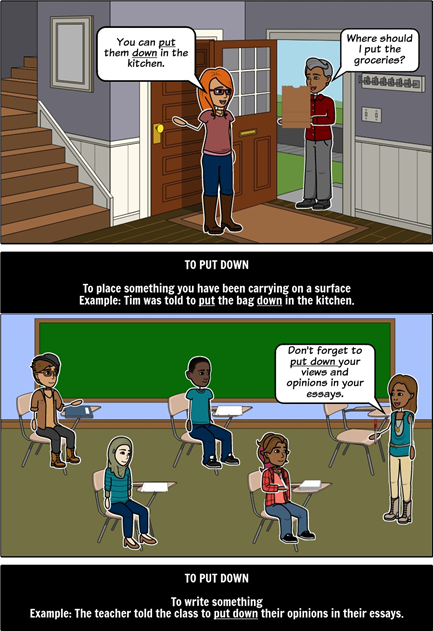
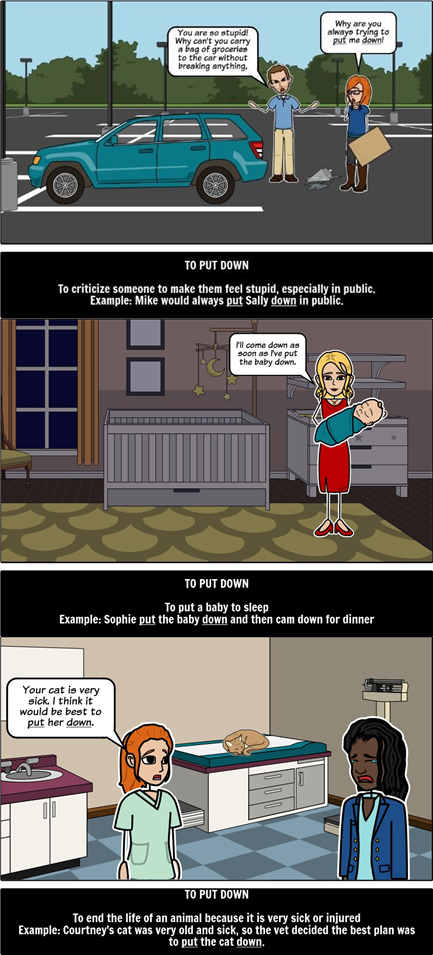
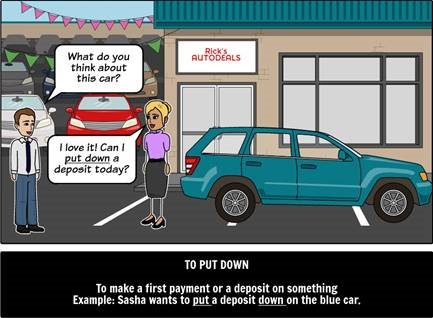
2. Translate into Ukrainian:
1. Emma put her bag down and went upstairs.
2. He’s always trying to put me down.
3. Stop putting yourself down. You’re a very intelligent woman.
4. We’re probably going to have the cat put down next week.
5. I put my name down on the list. Can you put your phone number down in the book?
6. I’ve put you down to help with the food.
7. We’ve put down a deposit on a new car.
8. Can you put me down by the library?
To put off 1. Look at the pictures, guess the meanings of the phrasal verb and describe them:
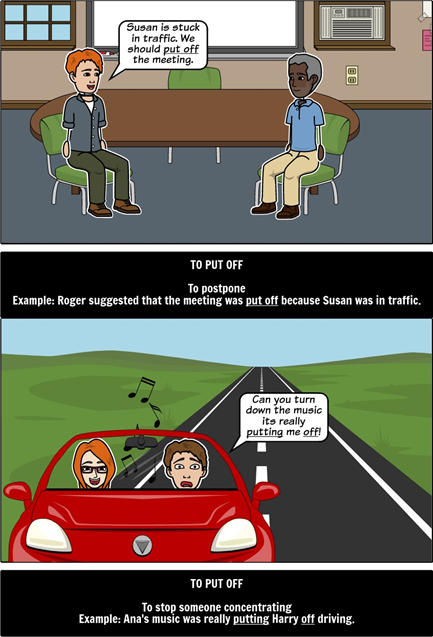
2. Translate into Ukrainian:
1. The match has been put off until tomorrow because of bad weather.
2. I put off going to the doctor but I wish I hadn’t.
3. Don’t let the restaurant’s decor put you off – the food is really good.
4. Don’t let your failures put you off trying harder.
5. When he calls, put him off as long as you can.
6. It puts me off when you watch me all the time.
7. Commissioners decided to put off voting on the proposal until next month.
8. Very urgent business which he'd been putting off.
To put up with
1. Look at the pictures, guess the meanings of the phrasal verb and describe them:
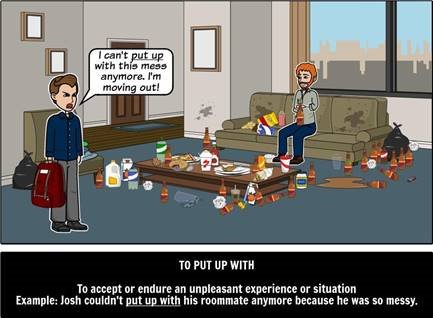
2. Translate into Ukrainian:
1. I can put up with the house being messy, but I hate it if it's not clean.
2. He's so moody - I don't know why she puts up with him.
3. They have a lot to put up with (= they have a lot of difficulties).
4. The fact that they were none of these things was something she had to put up with.
5. People would never put up with it before then.
6. If he had been attached only to me, he would not have the strength to put up with me now.
7. So why do they put up with the real foreigners?
8. Gabby found herself wondering how Jane put up with them at all.
9. For the moment, she would have to put up with things the way they were.
![]() To throw away
To throw away
1. Look at the pictures, guess the meanings of the phrasal verb and describe them:
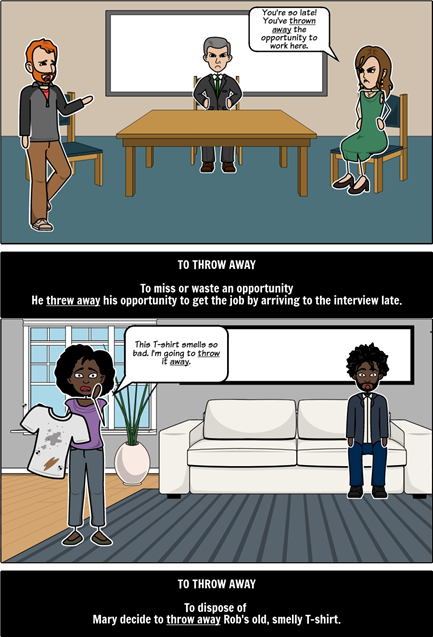
2. Translate into Ukrainian:
1. I never throw clothes away.
2. I shouldn’t have thrown away the receipt.
3. I can’t afford to throw money away.
4. This could be the best chance you’ll ever have. Don’t throw it away!
5. I was glad to throw mine away.
6. Do we throw the frame away or can we just take a section out and weld a new section in.
7. Then she pulled the old one out and threw it away, over the edge of the roof.
8. Britain must now throw this opportunity away by electing a Labour government.
To try on
1. Look at the pictures, guess the meanings of the phrasal verb and describe them:
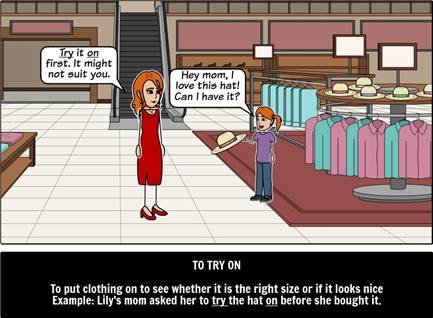
2. Translate into Ukrainian:
1. Meg was trying on some red sandals.
2. What a lovely dress! Why don’t you try it on?
3. They always try it on with a new teacher.
4. If you think that game’s easy, try this one on for size.
5. Try on those shoes.
6. If you try on a piece of clothing, you put it on to see if it fits you or if it looks nice.
7. Try on clothing and shoes to make sure they fit.
8. They're just trying it on–I don't believe they'll go this far.
To turn down
1. Look at the pictures, guess the meanings of the phrasal verb and describe them:
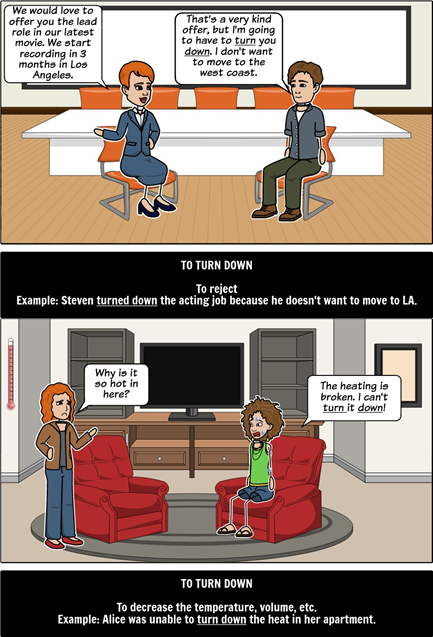
2. Translate into Ukrainian:
1. How could you turn down such a fantastic job? I don’t believe it: he turned me down flat!
2. Can you turn the music down a bit? The lights were turned down low.
3. The top sheet had been neatly turned down.
4. They offered her the job but she turned it down.
5. I’m not going to turn down an invitation to go to New York!
6. Josie’s already turned him down (=refused his offer of marriage).
7. Can you turn the TV down? I’m trying to work.
8. The Michigan Supreme Court turned her down in 1994 and on Monday, the Supreme Court affirmed that opinion.
To turn off 1. Look at the pictures, guess the meanings of the phrasal verb and describe them:
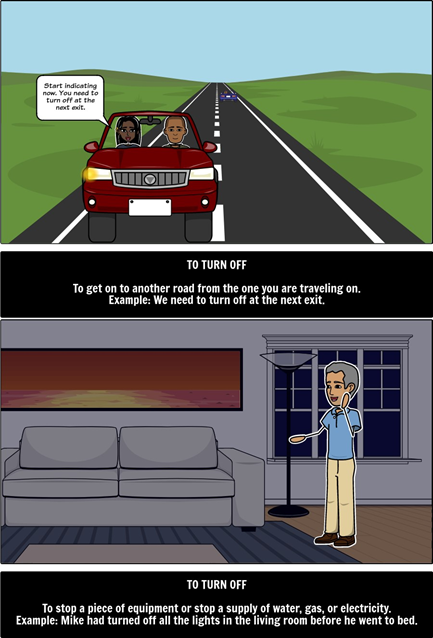

2. Translate into Ukrainian:
1. Don’t forget to turn the lights off when you leave.
2. They’ve turned the gas off for a couple of hours.
3. I think we should have turned off at the last exit.
4. Any prospective buyer will be turned off by the sight of rotting wood.
5. Men who stink of beer really turn me off.
6. Organizers are considering turning off the air-conditioning for the event, or using it only sporadically.
7. She turned off the water and stepped out on to the rug, dried herself, and dressed in jeans and a shirt.
8. There is no doubt that the ventilator may be turned off when in fact, the patient is already dead.
To turn up
1. Look at the pictures, guess the meanings of the phrasal verb and describe them:
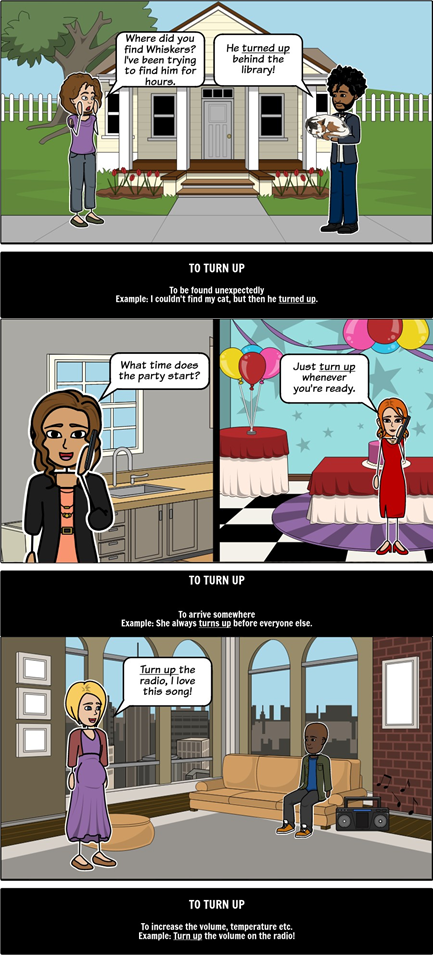
2. Translate into Ukrainian:
1. Turn the oven up to 220.
2. Eventually my watch turned up in a coat pocket.
3. Don’t worry, I’m sure a job will turn up soon.
4. Would you mind turning the heat up?
5. A thorough examination of the company's account books turned up several interesting facts.
6. We hooked up my stereo and turned up the volume as loud as it would go.
7. They might turn up on time and do all the right things, or they might not. 8. The police investigation hasn’t turned up any new evidence.
To watch out
1. Look at the pictures, guess the meanings of the phrasal verb and describe them:
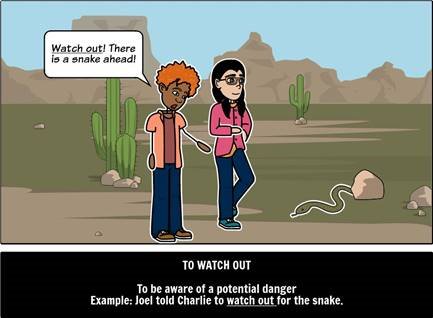
Translate into Ukrainian:
1. You’ll become an alcoholic if you don’t watch out.
2. Watch out – you’re going to hit that car!
3. You could have a nasty accident if you don’t watch out.
4. "Watch out!" he shouted, but it was too late - she had knocked the whole tray of drinks onto the floor.
5. Watch out for thieves round here.
6. Watch out! It's rather wet over there.
7. Watch out for bears!
8. He wants your job. Watch out for him.
9. Watch out, the baby is dribbling on your shirt!
3. Match the pictures with the correct phrasal verbs:
to pass out, to pull over, to put down, to put off, to put up with, to throw away, to try on, to turn down, to turn off, to turn up, to watch out
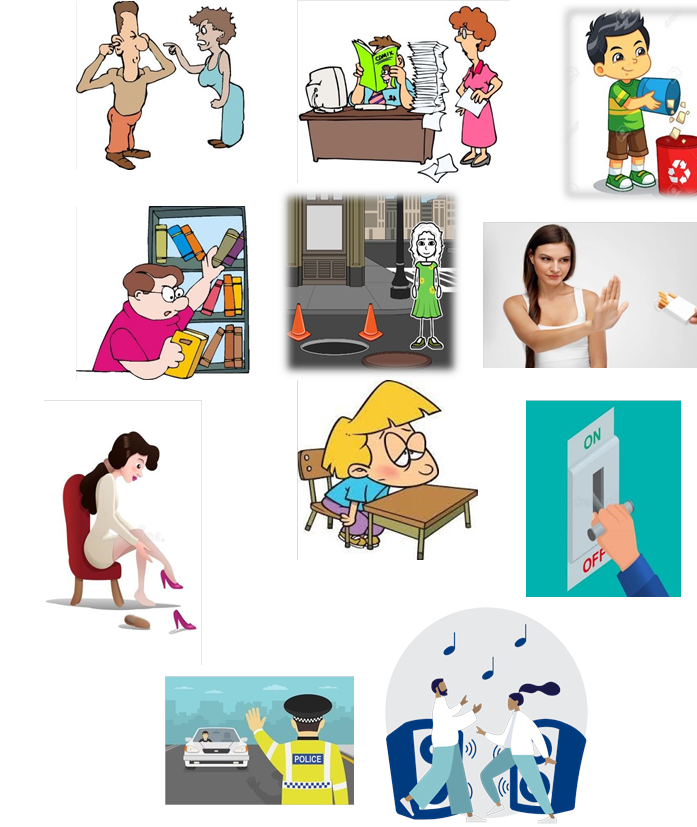
ДОДАТКИ THE LIST OF PHRASAL VERBS
1. to add up - to increase gradually until there is a large amount; to calculate the total of two or more prices, numbers, etc.
2. to blow up - to suddenly become very angry; needing to be filled with air in order to be used.
3. to bring up - to start to talk about a particular subject; to vomit something.
4. to call off - to decide that a planned event, especially a sports event, will not happen, or to end an activity because it is no longer useful or possible; to decide that something that has already been planned will not happen.
5. to call on - If a worker such as a doctor is on call, he or she is available to work or make official visits at any time when needed.
6. to carry on - to behave in an uncontrolled, excited, or anxious (= worried and nervous) way; behaviour that shows you are annoyed, worried, not satisfied, or excited, usually more than the situation deserves.
7. to cheer on - to shout loudly in order to encourage someone in a competition.
8. to cheer up - If someone cheers up, or something cheers someone up, they start to feel happier.
9. to come across - to behave in a way that makes people believe that you have a particular characteristic.
10. to come up with - to suggest or think of an idea or plan.
11. to do over - to attack someone violently.
12. to fall apart - to break into pieces; If an organization, system, or agreement falls apart, it fails or stops working effectively.
13. to fill out - If someone who is thin fills out, they become heavier and more rounded, often because they have grown older; to write or type information in spaces that are provided for it.
14. to get along - if two or more people get along, they like each other and are friendly to each other; to deal with a situation, usually successfully.
15. to get away - to leave or escape from a person or place, often when it is difficult to do this; to go somewhere to have a holiday, often because you need to rest.
16. to get over - to accept an unpleasant fact or situation after dealing with it for a while; to return to your usual state of health or happiness after having a bad or unusual experience, or an illness.
17. to give away - something that is given free to a customer; something that tells or shows something secret, often without intending to.
18. to give back - to return something to the person who gave it to you.
19. to go on - to happen; to move to the next thing or stage.
20. to hand in - to give something to a person in authority; If you hand in something such as homework or something that you have found, you give it to a teacher, police officer, or other person in authority.
21. to hang up - to end a phone conversation.
22. to hold on - used to tell someone to wait for a short time; to manage to stay alive or to deal with a difficult situation.
23. to hold up - to remain strong or successful.
24. to leave out - to not include someone or something.
25. to look after - to take care of or be in charge of something.
26. to look forward to - to feel pleased and excited about something that is going to happen; used at the end of a formal letter to say you hope to hear from or see someone soon, or that you expect something from them.
27. to look over - to quickly examine something.
28. to look up - to become better.
29. to pass out - to become unconscious for a short time, for example when ill, badly hurt, or drunk; to leave a military college after successfully finishing the course. 30. to pull over - If a vehicle pulls over, it moves to the side of the road and stops. 31. to put down - an unkind remark that makes someone seem silly; a negative statement about someone; insult.
32. to put off - to decide or arrange to delay an event or activity until a later time or date.
33. to put up with - to accept or continue to accept an unpleasant situation or experience, or someone who behaves unpleasantly.
34. to throw away - to waste a skill or opportunity.
35. to try on - to put on a piece of clothing to discover if it fits you or if you like it. 36. to turn down - if the economy or market turns down, there is less business activity and fewer opportunities to make money.
37. to turn off - a road that leaves another road to go in a different direction; something that you dislike or that you do not find interesting or sexually exciting.
38. to turn up - If a better situation or an opportunity to do something turns up, it happens or becomes available unexpectedly or in a way that was not planned.
39. to watch out - used to warn someone of danger or an accident that seems likely to happen.
THE LIST OF PHRASAL VERBS WITH PICTURES
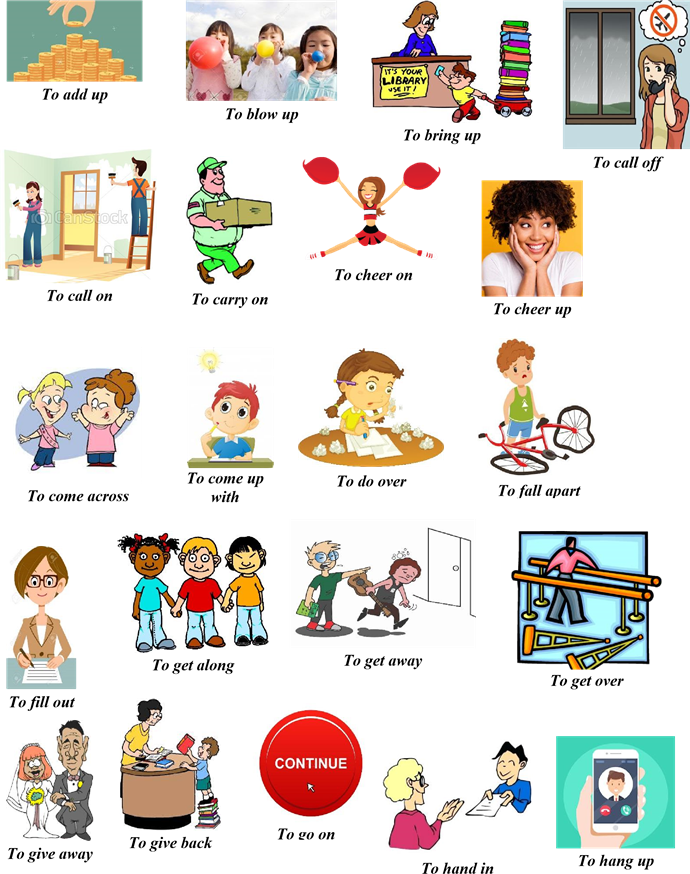
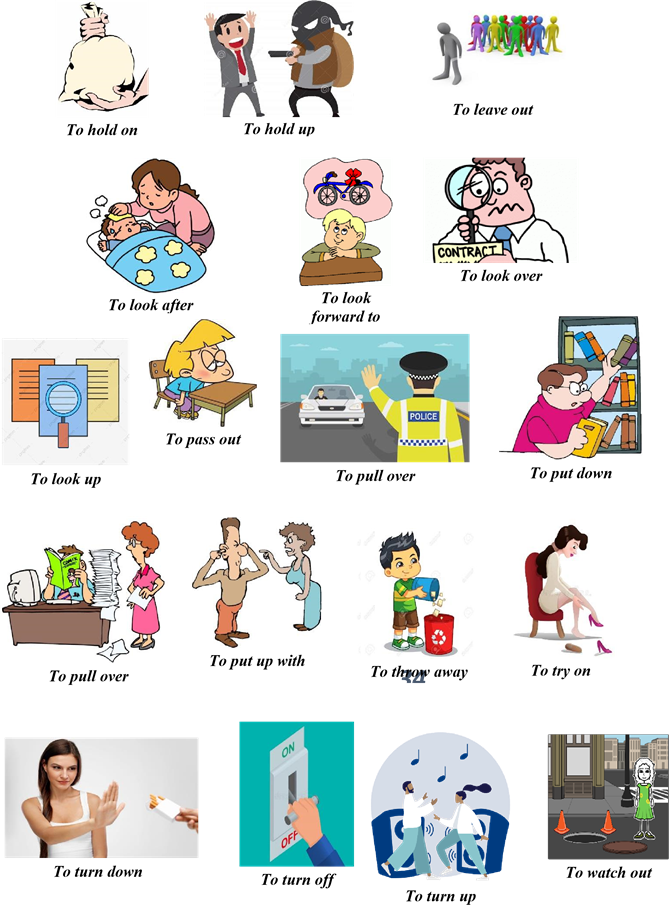
ВИСНОВКИ
Інфографіка або інформаційна графіка (англ. Information graphics, infographics) – це спосіб графічного відображення інформації, даних і знання, спрямований на швидке й чітке подання необхідної та складної інформації. Інфографіка «показує приховане, пояснює заплутане і адаптує незрозуміле» [4]. Дві треті інформації людина отримує через органи зору, водночас мислить і образами, що мають візуальну форму. Тому інформація, яка представлена візуально, сприймається швидше і викликає підвищену увагу, оскільки складає комплекс готових образів. При цьому текстовий контент завжди повинен знаходитись на першому місці [4].
Серед найвідоміших і фундаментальних праць з інфографіки варто назвати книги Ж. Бертена «Семіологія графіки», К. Уейр «Візуалізація інформації: сприйняття дизайну», Е. Тафті «Візуальне пояснення», Р. Крама «Крута інфографіка: ефективна комунікація з візуалізації даних та дизайну», в яких автори насамперед вказують на значення цього засобу візуалізації інформації в сучасному інформаційному просторі.
Перевага інформаційної графіки в тому, що вона дозволяє просто і наочно представити велику кількість даних або комплексну інформацію про предмети, включаючи складні взаємовідносини між ними. Її форми: карикатура, діаграма, ілюстрація, емблема, малюнок, стрічка часу із світлиною або посиланнями на певну інформацію, хмаринка тегів, мапи, плакати, схеми тощо. Будь-який образ підходить для створення інфографіки, якщо він добре сприймається, запам’ятовується, ефективно працює для передання даних. Основна мета інфографіки – інформування, при цьому її часто застосовують в якості доповнення до основного тексту. Стиль інфографіки залежить передусім від мети і адресата. Інфографіка базується на певних законах, тому далеко не кожне зображення з даними можна назвати інфографікою [8, с. 381].
Один з перших адептів інфографіки А. Каіро робить такі зауваги щодо створення ефективної візуалізації даних: 1) додавання контексту (крім власне графіків і малюнків повинна бути додаткова інформація, пов’язані з темою деталі); 2) детальний аналіз інформації має передувати її візуалізації, яку не варто спрощувати; 3) скептичне відношення до творчості, концентрація на фактах, оскільки візуалізація створюється не для перегляду, а для читання; 4) фокусування на тому, що дійсно важливо, врахування потреб цільової аудиторії [7]. Тож створення інфографіки не є простою річчю, її використання має бути доцільним і обміркованим.
У викладанні іноземної мови доцільно використовувати інфографіку при активізації лексичних одиниць, засвоєнні граматичних явищ, описі малюнків, моделюванні мовних ситуацій задля розвитку навичок монологічного та діалогічного мовлення, а також для тренування у використанні лексикограматичного матеріалу [3]. Найчастіше створюють інфографіку для візуалізації фразових дієслів (http://www.myenglishteacher.eu/blog/15mostuseful-phrasal verbs-infographic/), тематичної лексики
(http://www.myenglishteacher.eu/blog/vacation-improveyourvocabularyinfographic/, https://www.storyboardthat.com/ru), граматики (http://blog.visual.ly/grammar-spelling-infographics/), ідіом
(http://englishwithatwist.com/2014/05/16/happy-8-idioms-to-describe-happiness/) тощо.
На занятті інфографіку найкраще використовувати з інтерактивними дошками, куди вона проектується, або надрукувати її. Яскраві роздаткові матеріали завжди дуже популярні серед студентів, які можуть звертатися до інфографіки за потреби. Водночас інфографіка може стати мотивуючим засобом при подальшому виконанні навчального завдання. Студенти побачать доступне пояснення граматики і потім зможуть перевірити своє розуміння правил у виконанні відповідних вправ.
Окрім граматики, інфографіку варто використовувати при вивченні складних для сприйняття і запам’ятовування одиниць мови, особливо ідіом і фразових дієслів. Візуалізація абстрактних висловлювань допоможе легко і швидко засвоїти комплекс необхідної лексики і запровадити її у практику мовлення. Mind map стане у нагоді при вивченні лексико-граматичного матеріалу, при чому на різних етапах – від уведення нової теми до її повторення і узагальнення. Також на використанні цих мап можна побудувати й систему комунікативних вправ і аналіз професійно орієнтованих текстів, групову, індивідуальну і самостійну роботу студентів. Наприклад, наводимо інтелектуальну мапу, у фокусі якої Present Simple англійського дієслова в активному стані [10] (рис. 4). Дослідивши цю мапу, студент матиме чітке уявлення, як будуються граматичні форми дієслів у ствердному, питальному і заперечному реченнях, коли варто використовувати цей час та як правильно додавати закінчення -s. Водночас така mind map є зручною при повторенні матеріалу, коли необхідно у короткий термін охопити великий обсяг інформації.
ПЕРЕЛІК ВИКОРИСТАНИХ ДЖЕРЕЛ
1. Бьюзен Т. Супермышление; пер. с англ. Е. Самсонов. – 2-е изд. / Т. Бьюзен, Б. Бьюзен. – Мн.: ООО «Попурри», 2003. – 304 с.
2. Гoрдєєва А. Формування англомовної лексичної компетентності молодших школярів з використанням карт пам’яті / А. Гoрдєєва, С. Кулик // Іноземні мови. – 2013. – № 2. – С. 13–18.
3. Зіннуров Е. Технологія використання інформаційних засобів навчання на уроці іноземної мови / Е. Зіннуров // Методична скарбничка міста Новограда-Волинського. [Електронний ресурс]. – Режим доступу: http:// www.nv-imc.edukit.zt.ua/news/id/2125/vn/Технологія-використанняінформаційних засобів-навчання/
4. Кочеванов А. Инфографика: вчера, сегодня, завтра / А. Кочеванов.
[Електронний ресурс]. – Режим доступу: http://infogra.ru/infographics/info grafika-vchera-segodnya-zavtra.
5. Кубрак Н. Мастерская «Инфографика в работе с детьми» / Н. Кубрак.
[Електронний ресурс]. – Режим доступу: https://sites.google.com/site/info gradeti/home.
6. Мапа думок [Електронний ресурс]. – Режим доступу: https://uk.wikipedia.org/wiki/Мапа_думок.
7. Перес Д. Советы Альберто Каиро по эффективной визуализации данных / Д. С. Перес. [Електронний ресурс]. – Режим доступу: http://ijnet.org/ru/node/ 7747.
8. Савчук І. Використання візуалізації та інфографіки в навчанні декоративно-ужитковому мистецтву / І. Савчук // Проблеми та перспективи формування національної гуманітарно-технічної еліти: зб. наук. праць / ред. Л. Л. Товажнянський, О. Г. Романовський. – Харків: НТУ «ХПІ», 2015. – Вип. 42 (46): матеріали міжнар. наук.-практ. конференції «Ідеї академіка Івана Зязюна у працях його учнів і соратників», 14–15 травня 2015 р. – С. 380–386. 9. Idioms describing people. [Електронний ресурс]. – Режим доступу:
http://manutd4me.blogspot.ru/2014/04/idioms-describing-people.html. 10. Present Simple. [Електронний ресурс]. – Режим доступу:
http://weallswim together.blogspot.ru/2014/09/unit-1-present-simplecontinuous.html
11. https://www.storyboardthat.com/portal/dashboard2

про публікацію авторської розробки
Додати розробку
